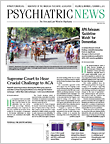APA is calling for a public-health approach to the problem of firearms-related violence, while also supporting protections for the legitimate rights of individuals with mental illness.
At its December 2014 meeting, APA’s Board of Trustees approved the “Position Statement on Firearm Access, Acts of Violence, and the Relationship to Mental Illness and Mental Health Services,” which draws from policies from related position papers approved in the last 15 years. The new position statement supports several regulatory measures regarding firearms-related violence—including background checks and waiting periods for all gun sales, reasonable restrictions on access to firearms, and ensuring that physicians are free to make clinically appropriate inquiries of patients and others about possession of and access to firearms.
But the statement also emphasizes that only a small percentage of violence against others is attributable to people with mental disorders (estimated at 3 percent to 5 percent of the U.S. population, excluding substance use disorders).
The statement calls for a fair process for restoration of firearms rights for individuals who have been barred from gun ownership and opposes restriction of gun ownership simply on the basis of nonadjudicated events (see box).
“APA recognizes the critical public-health need for action to promote safe communities and reduce morbidity and mortality due to firearms-related violence,” APA President Paul Summergrad, M.D., told Psychiatric News. “Many deaths and injuries from gun violence can be prevented through common-sense national and state legislative and regulatory measures. However, the vast majority of gun violence toward others is not attributable to mental illness. We view the problem of firearms-related injury and death as requiring a broader public-health approach rather than one that focuses narrowly on mental disorders or on the small number of cases in which serious mental illness is a precipitating factor in gun violence directed at others.
“APA’s position statement puts our Association on record as supporting a public-health approach to gun violence while also protecting the legitimate rights of individuals with mental illness. Regardless of our views on gun ownership, persons with the broad range of mental disorders, which after all include anxiety, postpartum depression, and posttraumatic stress disorders, should not be subject to more stringent controls over gun ownership than persons convicted of criminal offenses.”
In comments to Psychiatric News, Steven Hoge, M.D., chair of the APA Council on Psychiatry and Law (which helped formulate the position statement), and council vice chair Debra Pinals, M.D., emphasized that the statement policies, which were spelled out in a number of previous statements, go back to the late 1990s.
“For all APA members, and especially for those of us who get called by the press to comment on the subject of firearms-related violence, the new position statement pulls together prior statements in keeping with the evolving landscape pertaining to firearms, mental illness, and reporting requirements into a national database,” Hoge said.
Pinals, who chaired the work group for the APA Council on Psychiatry and Law that drafted this position statement and accompanying resource document, noted that many states have adopted legislation that loosens rather than tightens firearms restrictions, and some have broadened the focus on individuals with mental disorders who are reported into a national database.
“For this reason, it is important that APA point to and support broader-based public-health approaches rather than focus on mental illness in a way that is stigmatizing and unequal in its treatment of a particular class of individuals,” she said. “The statement aims to hold the line to ensure that physicians can make appropriate inquiries into firearms access as part of clinical care; that training, education, and research related to firearms violence continue to be funded; and that efforts that minimize firearms access for all people known to be at risk of danger be strengthened.”
She added, “The statement continues to recognize that suicide risk by firearms for individuals with mental illness is a significant issue. However, as noted in the statement, contrary to popular belief, violence to others, though tragic and in some cases involving emotional and mental disorders, is not overall accounted for by mental illness.” ■
All position statements can be accessed in APA’s policy-finder
database.
